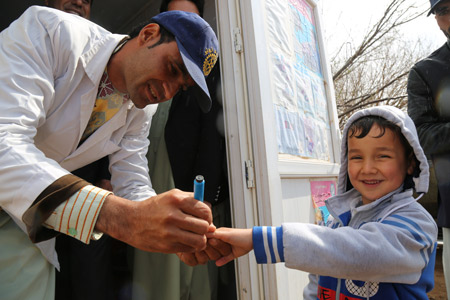
26 July 2024, Cairo, Egypt - Health ministers from across the Eastern Mediterranean Region have united to address the polio emergency in the occupied Palestinian territory. The urgent need for coordinated, collective regional action to combat circulating variant poliovirus type 2 (cVDPV2) in the Gaza Strip was the focus of the 11th meeting of the Regional Subcommittee on Polio Eradication and Outbreaks. WHO Regional Director for the Eastern Mediterranean Dr Hanan Balkhy convened the meeting, held virtually on 25 July 2024.
The confirmation of poliovirus adds to the multiple threats faced today by children in the Gaza Strip, who had access to robust routine vaccination services prior to the war - and raises concerns about the potential for widespread poliovirus transmission and paralytic polio. While an estimated 99% of children in the occupied Palestinian territory received their third dose of polio vaccine in 2022, this fell to 89% in 2023 according to the latest routine immunization estimates by WHO and the United Nations Children’s Fund (UNICEF)
Reflecting on her recent visit to the Gaza Strip, Dr Balkhy advocated for joint actions to urgently halt further spread of polio. “I witnessed at first hand living conditions that are highly favourable for the spread of polio and other diseases. This is an important time for the Subcommittee to come together to act swiftly and decisively to contain this outbreak, for the children of Gaza.”.
In attendance at the meeting were health ministers from Member States of the Eastern Mediterranean Region, Global Polio Eradication Initiative partners and the UNICEF regional directors for the Middle East and North Africa and South Asia.
Meeting participants were updated on the polio situation in the Gaza Strip. The participants then unanimously called on stakeholders and leaders across the Eastern Mediterranean Region, including parties to the conflict in the occupied Palestinian territory, to advocate strongly and immediately to ensure a safe and enabling environment, by way of a ceasefire or days of tranquility, to allow for steps to be taken to stop polio from paralyzing children in Gaza, and surrounding areas and countries.
These steps include intensified surveillance, multiple mass polio immunization campaigns that can be integrated with other crucial health service delivery when feasible, and enhanced community engagement to ensure that every child is protected.
Dr. Maged Abu Ramadan, the Minister of Health from the occupied Palestinian territory acknowledged the risks to the health of the population, particularly children, in Gaza and requested the support of Member States in building up their surveillance capacity on the ground to ensure any presence of poliovirus is detected promptly, along with laboratory support for testing environmental and human samples in neighboring countries of WHO’s Eastern Mediterranean Region.
The ministers of health emphasized the urgency for a coordinated regional effort to support the response in Gaza and surrounding countries, which would translate into a joint, robust regional poliovirus outbreak prevention and response plan. Offers of technical, logistic and laboratory support for ongoing testing of human and environmental samples from the Gaza Strip were pledged by Iraq, Jordan, Kingdom of Saudi Arabia, and Syria.
The Subcommittee also addressed the urgent need to stop all forms of poliovirus in the Eastern Mediterranean Region. It is home to the last two countries in the world with endemic wild poliovirus transmission – Afghanistan and Pakistan. Countries of the region are also facing active variant poliovirus outbreaks, such as in Somalia, Sudan and Yemen.
Dr. Salih Ali Al-Marri, Assistant Minister for Health Affairs spoke on behalf of Dr Hanan Al Kuwari, Minister of Health, Qatar and Co-chair of the Subcommittee, stressing that as long as polio continues to circulate in any part of our region, every country remains at risk. “These risks stem from challenges both out of our control like large-scale unusual population movements from infected areas, as seen recently in Pakistan and Afghanistan, conflict and lack of access and challenges we can address, such as gaps in programme leadership and coordination. Our strategies now, more than ever, must be more intelligent than those of the virus,” he said
Member States acknowledged ongoing efforts by the political and health leadership to address the remaining gaps in Afghanistan and Pakistan. They also noted the ongoing efforts to stem the outbreaks in Somalia, Sudan and Yemen.
Dr Hussain Al-Rand speaking on behalf of Mr Abdul Rahman Mohammed Al Owais, Minister of Health and Prevention, United Arab Emirates and Co-chair of the Regional Subcommittee also urged Member States to mobilize all available resources in support polio eradication, including prioritizing national-level surveillance and preparedness for polio detection and outbreaks. “The UAE, under the leadership of President His Highness Mohamed Bin Zayed Al Nahyan, has a longstanding history of contributing to global and regional efforts to end polio. I urge the Members of this Subcommittee to stand with us. Last week’s news that poliovirus is circulating in Gaza should be of grave concern to us all,” he said.
About the Regional Subcommittee on Polio Eradication and Outbreaks
The Regional Subcommittee on Polio Eradication and Outbreaks, established by the World Health Organization, focuses on coordinating and supporting efforts to eradicate polio and respond to outbreaks within the Eastern Mediterranean Region. The Subcommittee provides a platform for health ministers and stakeholders to share information, strategies, and resources to achieve a polio-free world.
Media Contact
Rimsha Qureshi, Communication Officer, WHO EMR/POL
Email:
Namita Mediratta, Communication Officer, WHO EMR/POL
Email:


